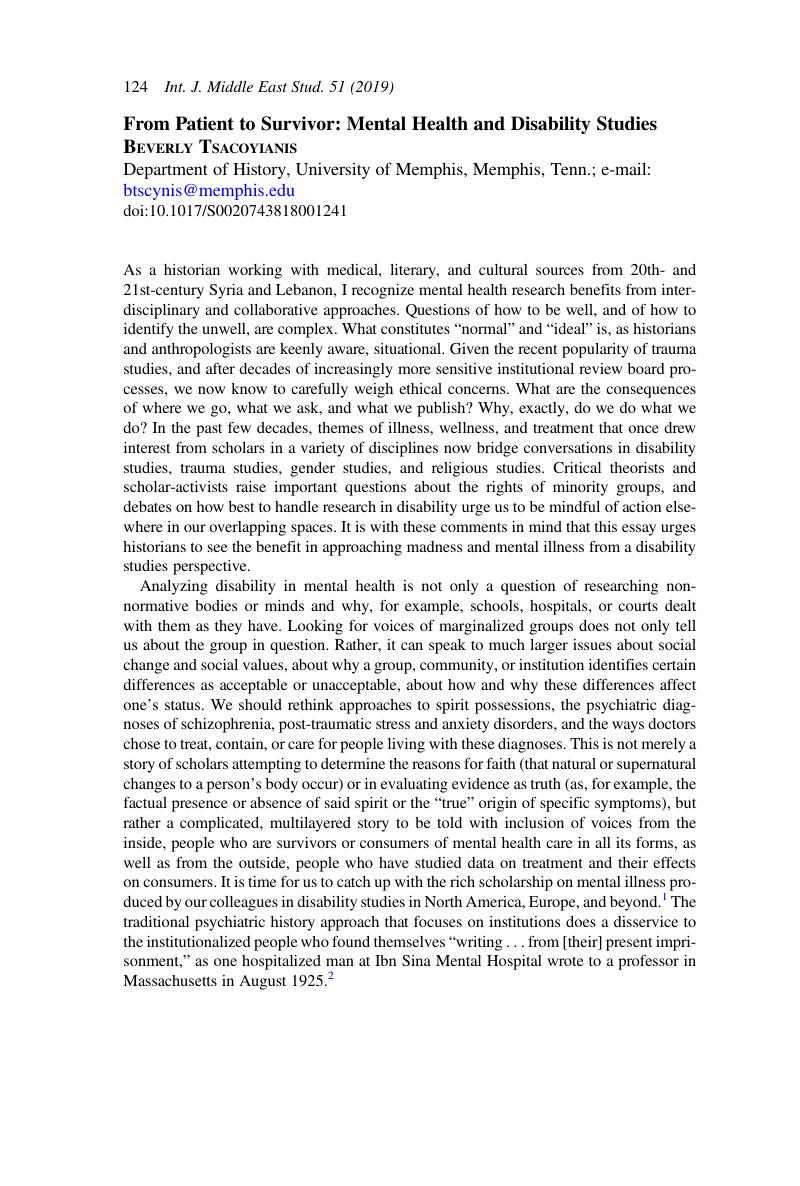No CrossRef data available.
Article contents
From Patient to Survivor: Mental Health and Disability Studies
Published online by Cambridge University Press: 11 January 2019
Abstract

- Type
- Roundtable
- Information
- Copyright
- Copyright © Cambridge University Press 2019
References
NOTES
1 See for example, the special issue on madness in Disability Studies Quarterly 33 (2013)Google Scholar, accessed 1 October 2018, http://dsq-sds.org/issue/view/100.
2 See Ibn Sina Mental Hospital Record 381. Though the date of first admission listed on the file is 1933, the patient's letters to the American professor George Read and to Muhammad Kurd Ali are dated prior to this year. Images of contents of this case file and of about 110 other individual patient case files are in this author's possession, with permission from the Syrian Ministry of Health to photograph the files in 2009 and 2010. Patients identified in the records range from the fifty-third person admitted to the hospital (case file #53, first admission 1925) to the 1,584th patient, admitted in February 1951.
3 See my current book manuscript in preparation for submission to a university press, Beverly Tsacoyianis, “Disturbing Spirits: Mental Illness, Trauma, and Treatment in Syria and Lebanon” (unpublished manuscript, 1 October 2018). I thank Eugene Rogan for graciously allowing me access to Asfouriyeh records in his possession while I was in Oxford to visit the Middle East Archives at St. Antony's College in the summer of 2014.
4 Ibn Sina Hospital Record 895, images in author's possession. Translation my own.
5 Ibn Sina Hospital Record 303, images in author's possession. Translation my own.
6 Ibn Sina Hospital Record 900, images in author's possession. This patient was admitted on 10 January 1946 and stayed at the hospital for nearly twenty-seven years, until his death on 1 November 1973. On debates over malingering in military medical discourse see also Yanikdağ, Yücel, Healing the Nation: Prisoners of War, Medicine and Nationalism in Turkey, 1914–1939 (Edinburgh: Edinburgh University Press, 2013)CrossRefGoogle Scholar.
7 Ibn Sina Hospital Record 878, related documents from 1946 to 1961. Translation my own.
8 See, for example, Yanikdağ, Healing the Nation, 171, where reports by military-medical authorities accused Ottoman soldiers suffering nervous breakdowns at the front lines as malingering, only to find that Turkish neuropsychiatrists shifted discourse a decade after the end of World War I to retroactively diagnose the prisoner soldiers with the same illnesses as nonprisoners during the war, and 77, where sources include “remarkably candid and passionate” handwritten prison camp newspapers authored by the prisoners of war that were meant to circulate only among other prisoners. There are also memoirs such as that of psychiatrist Katchadourian, Herant, The Way It Turned Out: A Memoir (Hoboken, N.J.: CRC Press, 2012)CrossRefGoogle Scholar, reflecting (esp. pp. 80–83) on the lasting trauma of his severe childhood illness in the 1940s.
9 Eghighian, Greg, “Introduction to the History of Madness and Mental Health,” in The Routledge History of Madness and Mental Health, ed. Eghigian, Greg (London: Routledge, 2017), 1–15, quote from 3CrossRefGoogle Scholar.
10 See Lang, Felix, The Lebanese Post-Civil War Novel: Memory, Trauma, and Capital (London: Palgrave macmillan, 2016)CrossRefGoogle Scholar; Anderson, Warwick, Jenson, Deborah, and Keller, Richard, eds., Unconscious Dominions: Psychoanalysis, Colonial Trauma, and Global Sovereignties (Durham, N.C.: Duke University Press, 2011)CrossRefGoogle Scholar; and Craps, Stef and Buelens, Gert, “Introduction: Postcolonial Trauma Novels,” Studies in the Novel 40 (2008): 1–12CrossRefGoogle Scholar.


